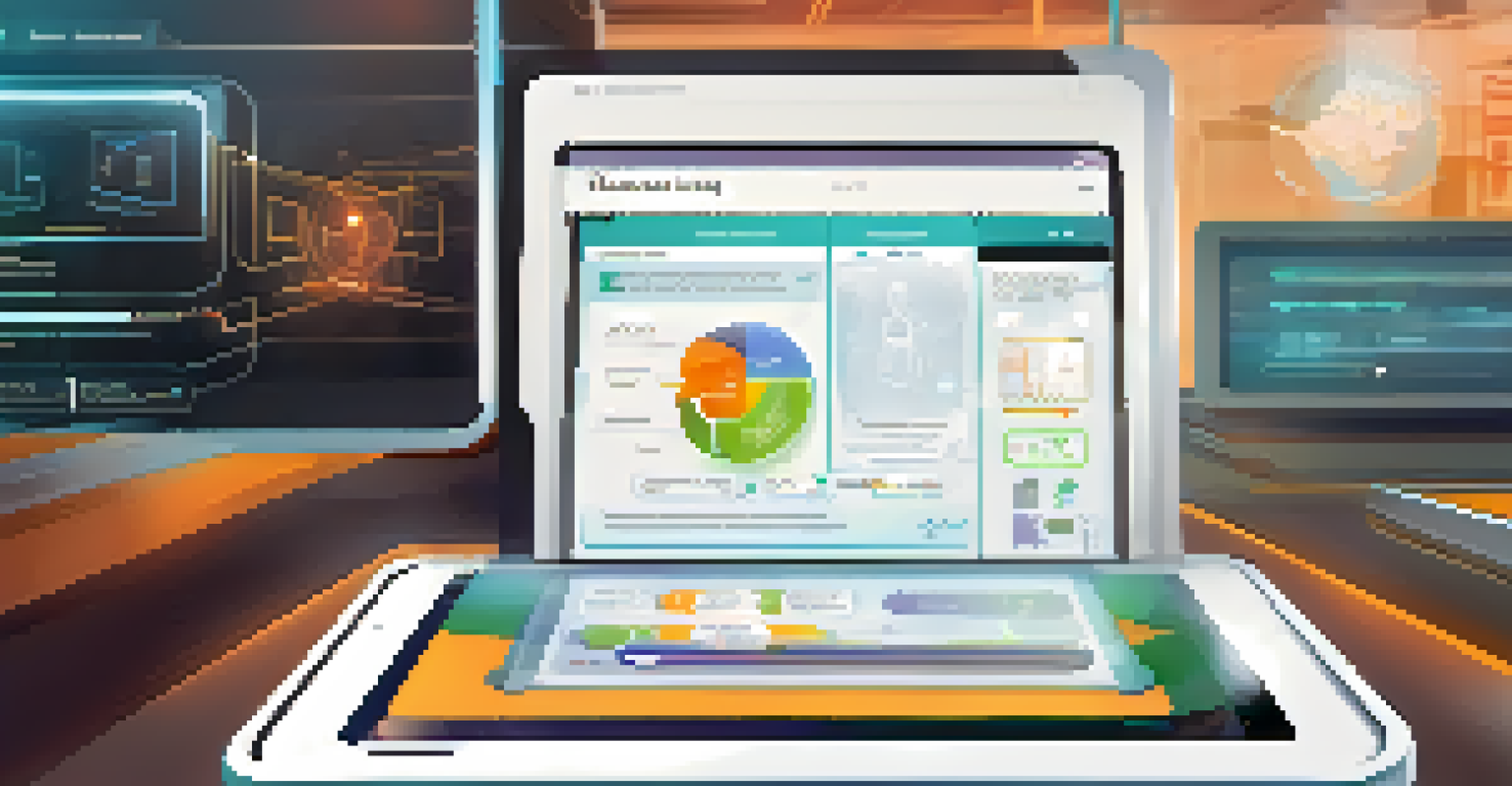Using Learning Management Systems for Remote Training

Understanding Learning Management Systems (LMS)
Learning Management Systems, or LMS, are powerful tools designed to facilitate online education and training. They provide a centralized platform where educators and trainers can create, manage, and deliver content efficiently. Think of an LMS as a digital classroom that breaks down geographical barriers, allowing learners to access resources anytime, anywhere.
The only person who is educated is the one who has learned how to learn and change.
An LMS typically includes features such as course creation, assessment tools, and progress tracking, which are essential for effective training. By utilizing these systems, organizations can ensure that their workforce is well-equipped with the necessary skills and knowledge. This is especially crucial in today's fast-paced digital environment, where continuous learning is key.
Moreover, the flexibility of LMS platforms enables organizations to tailor training programs to meet specific needs. Whether it's onboarding new employees or providing ongoing professional development, an LMS can adapt to various learning styles and preferences, making training more engaging and effective.
Benefits of Using LMS for Remote Training
One of the primary benefits of using an LMS for remote training is the ability to deliver consistent content to all learners. This ensures that everyone receives the same quality of training, regardless of location. Imagine a company with branches across the globe; an LMS can streamline training processes, maintaining uniformity and standards.

Additionally, LMS platforms often provide analytics and reporting features that help trainers assess learner performance. This data allows for informed decisions about future training initiatives and helps identify areas that require improvement. For instance, if a significant number of learners struggle with a specific module, it can be revised to better meet their needs.
LMS Enhances Remote Learning
Learning Management Systems provide a centralized platform for effective online education and training, breaking geographical barriers.
Another advantage is the cost-effectiveness of remote training via an LMS. By eliminating travel expenses and on-site training costs, organizations can allocate resources more efficiently. This not only saves money but also time, allowing employees to focus on their learning journey without the disruptions of traditional training methods.
Engaging Learners with Interactive Features
To keep learners engaged during remote training, LMS platforms often include interactive features such as quizzes, discussion forums, and multimedia content. These elements create a more dynamic learning experience compared to passive reading or watching videos. For example, incorporating gamification elements can encourage friendly competition and motivate learners to complete their courses.
Education is the most powerful weapon which you can use to change the world.
Moreover, interactive features promote collaboration among learners, which is essential for building a sense of community in a remote environment. Discussion forums allow participants to share insights and ask questions, fostering peer-to-peer support. This collaborative aspect can significantly enhance the learning process, making it more enjoyable and impactful.
Additionally, many LMS platforms offer mobile compatibility, allowing learners to access training materials on-the-go. This flexibility enables employees to learn at their convenience, fitting training into their busy schedules. As a result, organizations can improve completion rates and overall learner satisfaction.
Creating Personalized Learning Paths
Personalization is a key trend in modern education, and LMS platforms excel at enabling tailored learning experiences. By assessing learners' skills, preferences, and career goals, organizations can create customized training paths. Imagine an employee who aspires to be a manager; an LMS can provide targeted training that aligns with their professional development.
This personalized approach not only enhances learner engagement but also boosts retention and application of knowledge. When employees feel that their training is relevant to their roles, they are more likely to invest time and effort into completing their courses. Personalized learning paths can lead to improved job performance and higher employee satisfaction.
Personalized Learning Paths
LMS platforms enable tailored learning experiences by assessing individual skills and preferences, boosting engagement and job performance.
Furthermore, many LMS platforms incorporate adaptive learning technologies that adjust content based on individual performance. For example, if a learner excels in a topic, the system can provide advanced materials, while offering additional support for those who might be struggling. This adaptability ensures that all learners receive the appropriate level of challenge, maximizing their potential.
Ensuring Accessibility for All Learners
Accessibility is a crucial consideration when implementing remote training programs. LMS platforms often include features that support learners with disabilities, ensuring that everyone can participate fully. This might involve providing text-to-speech capabilities, closed captioning for videos, or alternative formats for written content.
By prioritizing accessibility, organizations not only comply with legal requirements but also foster an inclusive learning environment. When all employees feel valued and supported in their learning journey, it enhances morale and contributes to a positive workplace culture. This inclusivity can lead to higher engagement rates and overall training success.
Moreover, ensuring accessibility extends beyond physical disabilities; it also includes considerations for different learning styles. An effective LMS will offer a variety of content types, from videos to interactive exercises, catering to diverse preferences. This flexibility is essential for maximizing the effectiveness of remote training initiatives.
Integrating Feedback Loops for Continuous Improvement
Feedback is vital in any learning process, and an effective LMS facilitates continuous feedback loops. Trainers can gather insights from learners through surveys, course evaluations, and ongoing assessments. This feedback is invaluable for fine-tuning training content and approaches, ensuring they remain relevant and effective.
Additionally, feedback allows trainers to identify trends and patterns in learner performance. For instance, if multiple learners express confusion about a specific topic, it may indicate a need for clearer explanations or additional resources. By addressing these concerns promptly, organizations can enhance the overall quality of their training programs.
Future of LMS with New Tech
Advancements like AI and VR are set to revolutionize LMS, creating immersive and personalized training environments for learners.
Encouraging a culture of feedback also empowers learners to take an active role in their education. When employees see that their opinions matter, they are more likely to engage deeply with the training material. This sense of ownership can lead to increased motivation and improved learning outcomes.
Future Trends in LMS for Remote Training
As technology continues to evolve, so do Learning Management Systems. We can expect to see advancements like artificial intelligence (AI) being integrated into LMS platforms. AI can provide personalized recommendations for learners, helping them discover courses and resources that align with their interests and career goals.
Moreover, the rise of virtual reality (VR) and augmented reality (AR) will likely revolutionize remote training. These technologies can create immersive learning experiences, allowing employees to practice skills in simulated environments. For example, a healthcare professional could use VR to practice surgical procedures safely and effectively.

In addition, the growing emphasis on data analytics will further enhance the capabilities of LMS platforms. Organizations will be able to leverage data to predict training needs, assess program effectiveness, and make data-driven decisions. This focus on analytics will help organizations stay ahead of the curve in meeting the evolving demands of their workforce.